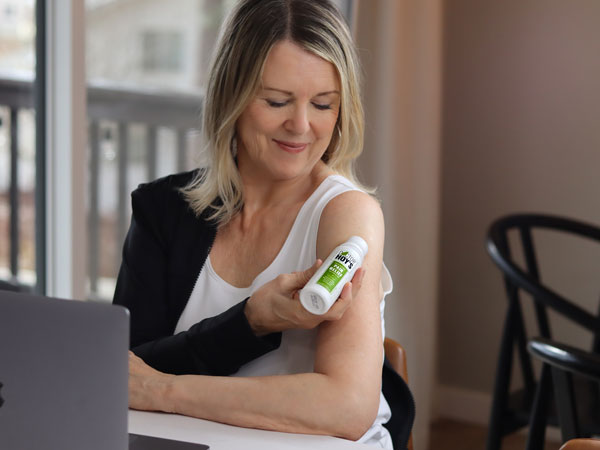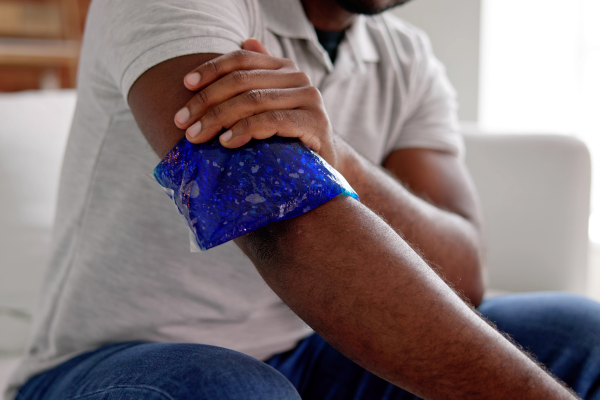Share

Is heat or cold better for arthritis?
Some of the easiest, most effective, and natural remedies for arthritis are heat and cold therapies. Applying heat to your lower back or knees loosens up stiff joints and encourages blood flow while the cold helps reduce swelling and inflammation during flare ups.
Both can help you manage arthritis symptoms, but whether heat or ice is better is up to personal preference. Doctor Hoy’s® Pain Relief Gel uses natural ingredients like topical menthol and camphor for a soothing, cool-to-warm sensation that relieves joint pain fast and lasts for hours.
Check out the following ways to use heat or ice for arthritis and how to safely incorporate natural remedies like Doctor Hoy’s into your everyday routine.

Doctor Hoy’s Uses Heat & Cold to Ease Joint Pain
The American College of Rheumatology conditionally recommends heat and cold therapy for people with osteoarthritis of the knees, hips, or hands. All arthritis sufferers can benefit from using hot and cold remedies including clinically proven Doctor Hoy’s topicals.
Doctor Hoy’s Pain Relief Gel is an FDA-approved natural pain reliever for joint pain from arthritis. It provides natural treatment for arthritis in the form of ingredients like all natural menthol, camphor, and anti-inflammatory arnica with no toxins, parabens, or aspirin derivatives.

Using the science of time release menthol, Doctor Hoy’s provides fast, long-lasting relief from joint pain and muscle aches for hours at a time. Recent consumer tests revealed 92% of Doctor Hoy’s users said it was the most effective topical pain relief gel they tried, while 90% of users experienced relief within minutes of use.
Useful in treatments like phonophoresis, Doctor Hoy's is safe, clean, and effective. It won’t risk damage to the skin like some other hot and cold therapies. For more information, see the benefits of Doctor Hoy’s and our FAQ page.
Heat Therapy
According to the Arthritis Foundation, heat therapy for arthritis can help relieve stiff joints and muscle aches. Great for osteoarthritis, rheumatoid and psoriatic arthritis, heat treatments are thought to expand the blood vessels and allow for more blood, oxygen, and nutrients to reach injured tissues.
Heat helps arthritis pain by managing common symptoms. The improved circulation relaxes muscles and surrounding tissues, easing stiff joints in the morning and reducing muscle spasms.
Types of Heat Therapy for Arthritis
Methods like hot/cold therapy packs, warm showers, and heating pads can be used daily to relieve joint pain and stiffness. If you use pain relief creams or gels like Doctor Hoy’s, avoid using a heating pad at the same time. Try these heat treatments before exercising or at the beginning of the day:
- Take a warm shower. Start your morning with a warm, 20-minute shower to reduce stiffness, ease lower back pain, and prepare your joints for the day ahead.
- Use a heating pad or compress. Buy heating pads for arthritis online or make your own by microwaving a damp washcloth for 20 seconds or filling a bottle with warm water. Apply it to the affected area for up to 20 minutes.
- Visit the sauna. A 2018 review found that using a dry sauna regularly could benefit people with rheumatoid arthritis by improving circulation and relieving stiffness. Ask your doctor before trying this method to ensure it is safe.
- Swim in a heated pool. Exercising in a warm pool 2 to 3 times a week can increase range of motion and reduce pain by up to 40 percent. Swimming helps improve strength and flexibility while the water puts less pressure on joints.
- Soak in a warm bath. Relaxing in a warm bath for 20 minutes a night can loosen up stiff joints, reduce muscle soreness, and relieve stress naturally. Add Epsom salts for a boost of magnesium, an essential mineral for bone health.

SAFETY TIPS
Using heat for arthritis should feel warm and never hot. Do not use heat therapy during a flare up, if you have a sensory condition, or your doctor recommends against it. When taking a warm shower or bath, drink plenty of water before and after to stay hydrated.
Cold Therapy
If you have painful, inflamed, or swollen joints, cold therapy for arthritis can help ease the pain from flare ups. Working opposite from heat, cold therapy constricts the blood vessels, which decreases blood flow and reduces swelling caused by inflammation.
Cold also numbs muscle pain and temporarily blocks pain signals from reaching the brain in a process called the Gate Control Theory of Pain. Cold therapy is best used after physical activity to soothe aching joints.
Cold Therapies for Arthritis
Cold treatments are convenient if you have access to a freezer, cold water, or a travel-friendly topical like Doctor Hoy’s Roll-On Gel. They can be used every day, but take precautions if you have conditions like neuropathy or poor circulation.
- Use an ice pack. Anything can be an ice pack from reusable gel cold packs to a bag of frozen vegetables. Apply the ice pack to the affected area in 10-minute intervals.
- Massage with an ice cube. Wrap an ice cube in a thin washcloth and use it to massage the area of pain or swelling. Freeze a water bottle and roll it under your hands or feet for relief from rheumatoid arthritis.
- Take a cold shower or bath. A 2016 study found that cold showers could help reduce pain from chronic inflammatory arthritis. With your doctor’s approval, soak in an ice bath for up to 15 minutes to ease inflammation.
- Apply topical menthol. Menthol is a natural analgesic with a cooling sensation that penetrates deep within the skin to relieve pain. Doctor Hoy’s pain relief gel uses menthol and camphor so you can get the benefits of both hot and cold therapies.

SAFETY TIPS
If your skin feels numb or increasingly painful, stop using cold therapy. Wrap all frozen items in cloth before applying them and avoid using treatments like ice packs beyond 10 minutes at a time to avoid damaging the skin.
Never use cold treatments on broken skin. Instead, you can reduce inflammation, swelling and promote healing faster with a natural arthritis cream like Doctor Hoy’s Arnica Boost Recovery Cream.
How long do you alternate heat and ice?
You can switch out between hot and cold therapies throughout the day for consistent relief from pain, stiffness, and swelling. Begin using ice for arthritis within the first 48 hours of a flare up for the most benefit.
Try each remedy about 2 to 3 times a day or when symptoms arise. The Arthritis Foundation recommends leaving a couple of hours between using hot or cold treatments.
Use Doctor Hoy’s for Natural Hot & Cold Pain Relief
Add Doctor Hoy’s to your pain management plan for natural topical arthritis pain relief anytime, anywhere. Shop Doctor Hoy’s hot and cold pain relief on our site and explore the blog for more tips on managing arthritis symptoms.
Doctor Hoy’s does not diagnose or prescribe treatment for medical conditions. Talk to your healthcare provider about what treatment methods are right for you and call your doctor about any new or worsening joint pain.
References:
Fulghum Bruce, D. PhD. (2022, January 19) Heat and Cold Therapy for Arthritis Pain. WedMD.
Cronkleton, E. (2012, December 2) Heat or Cold Therapy for Arthritis. Healthline.
Kolasinski, S. et al. (2020). 2019 American College of Rheumatology/Arthritis Foundation Guideline for the Management of Osteoarthritis of the Hand, Hip, and Knee. Arthritis Care & Research, 72(2), 149–162. https://doi.org/10.1002/acr.24131
Hinkka H, et al. (2016). Effects of cold mist shower on patients with inflammatory arthritis: a crossover controlled clinical trial. Scandinavian Journal of Rheumatology, 46(3), 206–209. https://doi.org/10.1080/03009742.2016.1199733
Hussain, J., & Cohen, M. (2018). Clinical Effects of Regular Dry Sauna Bathing: A Systematic Review. Evidence-Based Complementary and Alternative Medicine, 2018, 1–30. https://doi.org/10.1155/2018/1857413
Sayre, C. (n.d.). Heat Therapy Helps Relax Stiff Joint. Arthritis Foundation.
